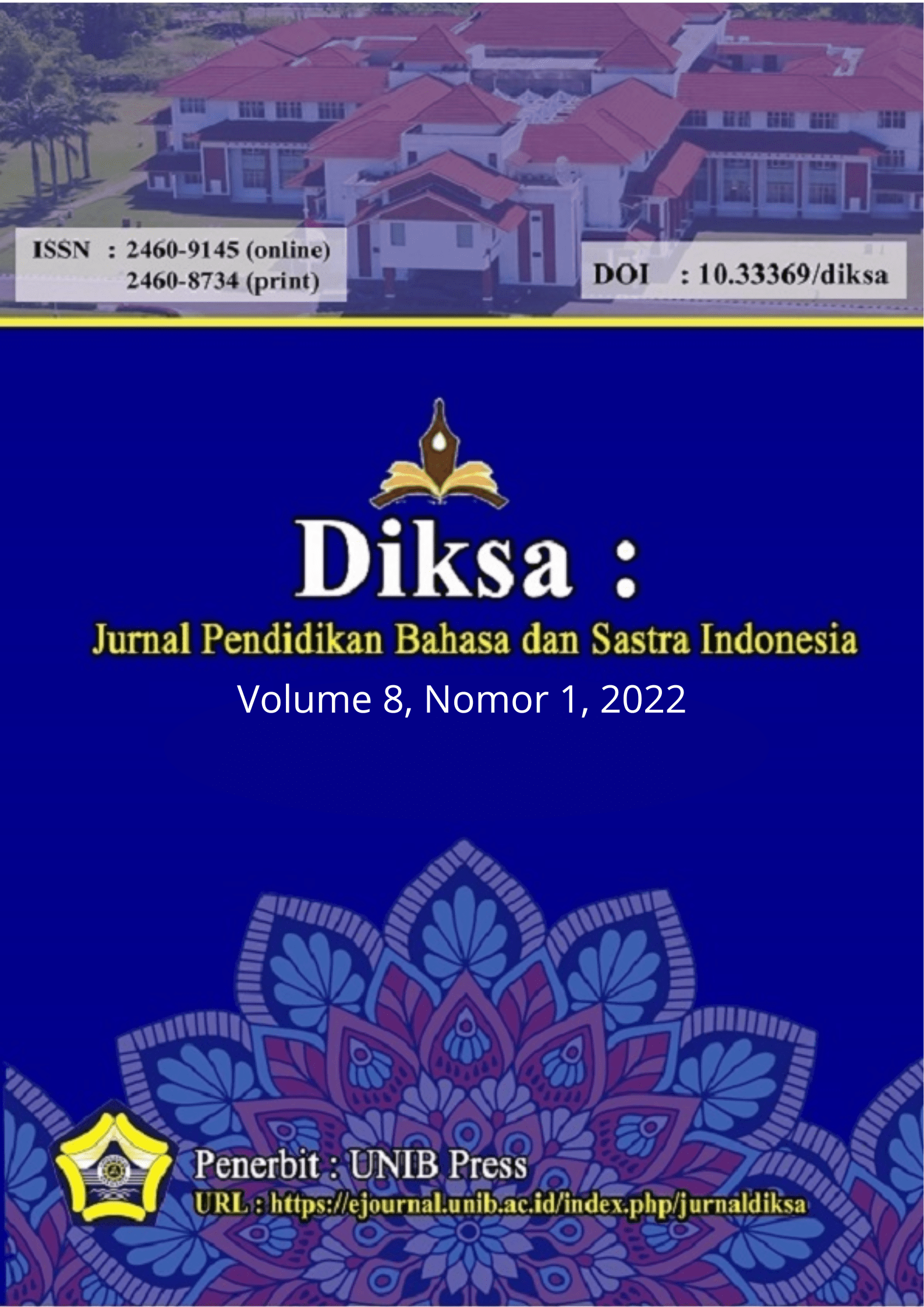Main Article Content
Abstract
The goals of this research were to 1) develop an Instagram-based e-module in German grammatical learning as a self-directed learning resource and 2) determine the feasibility of the Instagram-based e-module in German grammatical learning as a self-directed learning resource. This is a research and development using 4-D model (Define, Design, Develop, Disseminate). There were front-end analysis, student analysis, task analysis, concept analysis, and specification instructional objectives at the define stage. At the design stage, the initial design of e-module was made. At the develop stage, the expert validators provide assessments of the e-module followed by product testing and providing responses by German teacher and learners. In the last stage, the Instagram-based e- module in German grammatical learning as a self-directed learning resource was disseminated. The assesments obtained were 83% in the "very good" category from material validation, 92% in the "very good" category from media validation, 78% in the "good" category from German teacher response, and 87% in the "very good" category from learner responses. The average percentage generated was 85% so that the Instagram-based e-module in German grammatical learning got the "very good" category and is feasible to be used as a self-directed learning resource.
Keywords
Article Details
Authors who publish with this journal agree to the following terms:
- Authors retain copyright and grant the journal right of first publication with the work simultaneously licensed under a Creative Commons Attribution License that allows others to share the work with an acknowledgment of the work's authorship and initial publication in this journal.
- Authors are able to enter into separate, additional contractual arrangements for the non-exclusive distribution of the journal's published version of the work (e.g., post it to an institutional repository or publish it in a book), with an acknowledgment of its initial publication in this journal.
- Authors are permitted and encouraged to post their work online (e.g., in institutional repositories or on their website) prior to and during the submission process, as it can lead to productive exchanges, as well as earlier and greater citation of published work (See The Effect of Open Access).
References
- Daryanto. (2013). Menyusun Modul: Bahan Ajar untuk Persiapan Guru dalam Mengajar. Yogyakarta: Gava Media.
- DataReportal. (2021, July 20). Digital 2021Indonesia. https://datareportal.com/reports/digital-2021-indonesia
- Ernawati, Y. (2019). Pengembangan Lembar Kerja Peserta Didik (LKPD) pada Materi Teks Fabel Berbasis Saintifik untuk Siswa SMP Kelas VIII. Diksa: Pendidikan dan Sastra Indonesia, 5(2), 94-103. https://doi.org/10.33369/diksa.v5i2.9982
- Funk, H., & König, M. (1991). Grammatik Lehren und Lernen. Berlin: Langenscheidt. Khosiyono, B. H. (2018). Kebijakan Pendidikan Bahasa Asing di Indonesia dalam Perspektif Masyarakat Global. Jurnal Pembangunan Pendidikan: Fondasi dan Aplikasi, 6 (1), 70-82. https://doi.org/10.21831/jppfa.v6i1.20612
- Lovina, L., Fajar, N., Rahmi, E., & Sari, M. (2021). Pengembangan Modul Pembelajaran Berbasis Media Sosial Instagram Pada Mata Pelajaran Kimia Kelas X SMA N 1 Kecamatan Kapur IX. Konfigurasi, 6(2), 87-92. http://dx.doi.org/10.24014/konfigurasi.v5i2.14048
- Rahmawaty, R., & Arief, Z. A. (2020). Pengembangan Modul Digital Pembelajaran Bahasa Jerman Berbasis Android. Jurnal Teknologi Pendidikan, 9 (2), 147- 161. http://dx.doi.org/10.32832/tek.pend.v9i2.3183
- Rintjap, M. I., & Pujosusanto, A. (2019). Penggunaan Media Instagram untuk Keterampilan Menulis Bahasa Jerman SMA. LATERNE, 8(1). https://ejournal.unesa.ac.id/index.php/laterne/article/view/27480
- Sugiyono. (2012). Metode Penelitian Pendidikan (Pendekatan Kuantitatif, Kualitatif, dan R&D). Bandung: Alfabeta.
- Yamin, M. (2018). Paradigma Pendidikan Konstruktivistik. Jakarta: GP Press.
References
Daryanto. (2013). Menyusun Modul: Bahan Ajar untuk Persiapan Guru dalam Mengajar. Yogyakarta: Gava Media.
DataReportal. (2021, July 20). Digital 2021Indonesia. https://datareportal.com/reports/digital-2021-indonesia
Ernawati, Y. (2019). Pengembangan Lembar Kerja Peserta Didik (LKPD) pada Materi Teks Fabel Berbasis Saintifik untuk Siswa SMP Kelas VIII. Diksa: Pendidikan dan Sastra Indonesia, 5(2), 94-103. https://doi.org/10.33369/diksa.v5i2.9982
Funk, H., & König, M. (1991). Grammatik Lehren und Lernen. Berlin: Langenscheidt. Khosiyono, B. H. (2018). Kebijakan Pendidikan Bahasa Asing di Indonesia dalam Perspektif Masyarakat Global. Jurnal Pembangunan Pendidikan: Fondasi dan Aplikasi, 6 (1), 70-82. https://doi.org/10.21831/jppfa.v6i1.20612
Lovina, L., Fajar, N., Rahmi, E., & Sari, M. (2021). Pengembangan Modul Pembelajaran Berbasis Media Sosial Instagram Pada Mata Pelajaran Kimia Kelas X SMA N 1 Kecamatan Kapur IX. Konfigurasi, 6(2), 87-92. http://dx.doi.org/10.24014/konfigurasi.v5i2.14048
Rahmawaty, R., & Arief, Z. A. (2020). Pengembangan Modul Digital Pembelajaran Bahasa Jerman Berbasis Android. Jurnal Teknologi Pendidikan, 9 (2), 147- 161. http://dx.doi.org/10.32832/tek.pend.v9i2.3183
Rintjap, M. I., & Pujosusanto, A. (2019). Penggunaan Media Instagram untuk Keterampilan Menulis Bahasa Jerman SMA. LATERNE, 8(1). https://ejournal.unesa.ac.id/index.php/laterne/article/view/27480
Sugiyono. (2012). Metode Penelitian Pendidikan (Pendekatan Kuantitatif, Kualitatif, dan R&D). Bandung: Alfabeta.
Yamin, M. (2018). Paradigma Pendidikan Konstruktivistik. Jakarta: GP Press.
